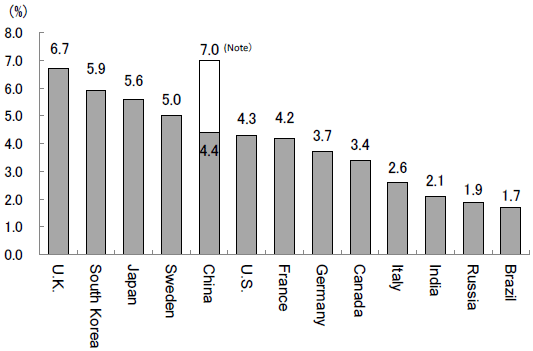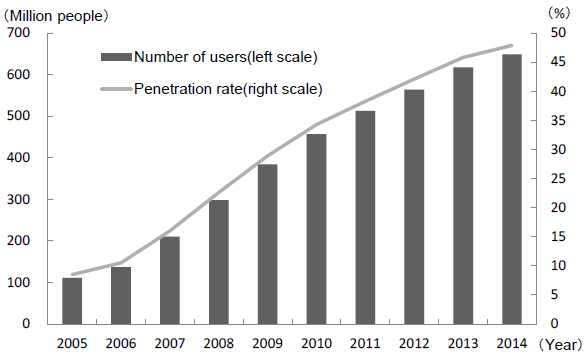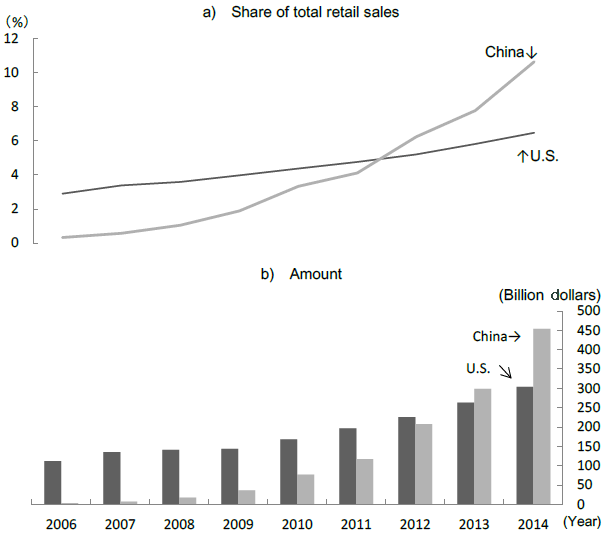Information and communications technology centering on the internet is creating a new wave of innovation. It has repercussions not only for the information and communications industry, but also for other industries as well. The internet emerged in developed countries, led by the United States, but it has become a potent tool for developing countries to catch up as its cost to use has been declining rapidly, in line with the speed of its technology advancement. Given that the international competitiveness of its labor-intensive products has weakened against the backdrop of a labor shortage, and that its growth rate has fallen sharply, China is seeking to bring new vitality to its industries by leveraging internet technology.
Economic effect of the spread of the internet
As the spread of the internet has improved the productivity of the overall economy and brought innovation, it will certainly lead to further economic growth. The growth of the internet contributes to the development of internet service-related industries and holds promise for the ripple effect of stimulating demand in the overall market in due course (Deloitte, "Value of Connectivity," Thought Leader's News, Vol. 2, June 2014).
First, by increasing access to information, the internet can increase productivity and enable markets to function more efficiently. The ability to send complex information and data via mobile phones and the internet reduces travel time and costs, and also improves organizational efficiency. Increased connectivity accelerates the spread of ideas and allows users worldwide to make use of new research and technologies.
Extending internet access can also increase market efficiency by removing barriers to entry, reducing transaction costs, and increasing transparency. Small and medium-sized enterprises (SMEs) will be able to reach a broader market if they take advantage of these benefits.
In addition, the internet is creating new jobs directly and indirectly. It encourages the demand for high-skilled labor, which will result in an increase in wages and earning power.
Finally, expanding internet access can also lead to a more fundamental advancement in the structure of economies across the developing world. It will transform the economy of many countries that are driven by agriculture and natural resources into a knowledge-based economy.
The fast-growing internet industry in China
These economic effects brought about by the internet have reached not only developed countries that have developed internet technology through huge costs, but also developing countries that can use it at a low cost. China is also benefiting fully from the spread of the internet, leveraging its latecomer advantage. Although the mainstream "digital divide" theory postulates that developing countries will lag further behind developed countries as a result of the rapid development of information and communications technology, China's experience shows the contrary.
According to a study by the McKinsey Global Institute, although the internet economy's share of GDP (iGDP) in China was 3.3% in 2010, falling behind that of many developed countries, it rose to 4.4% in 2013, reaching a level comparable to that of developed countries and overtaking the United States, France, and Germany, etc. (Figure 1) (Note 1). The McKinsey Global Institute predicts that "the internet will boost the annual growth rate of the Chinese economy by 0.3% to 1.0% from 2013 to 2025."

As of the end of 2014, internet users in China reached 649 million (31.17 million more than a year ago), and the internet penetration rate rose to 47.9% (Figure 2) (Note 2). Of the internet users, those who access the internet via mobile phones increased by 56.72 million in the previous 12 months to 556.78 million (85.8% of the total), exceeding those who access the internet via desktop personal computers (PCs) (70.8%), notebook PCs (43.2%), and tablets (34.8%). The internet is not only a tool for information acquisition and communications, but also it has come to exert influence on all areas of people's lives including consumption and entertainment. The utilization ratio of various internet services in 2014 was in the following order: "instant messaging" (90.6% of all internet users), "search engines" (80.5%), "news" (80.0%), "music" (73.7%), "videos" (66.7%), "online games" (56.4%), and "online shopping" (55.7%). Meanwhile, the utilization ratio is still relatively low in new areas such as "online payment," "internet banking," "travel booking," and "asset management," but shows high growth (Table 1).

| Application | Number of Users (million people) | Growth rate (YoY,%) | Utilization ratio (%) |
|---|---|---|---|
| Instant Messaging | 588 | 10.4 | 90.6 |
| Search Engines | 522 | 6.7 | 80.5 |
| News | 519 | 5.6 | 80.0 |
| Music | 478 | 5.5 | 73.7 |
| Videos | 433 | 1.1 | 66.7 |
| Online Games | 366 | 8.2 | 56.4 |
| Online Shopping | 361 | 19.7 | 55.7 |
| Online Payment | 304 | 17.0 | 46.9 |
| Online Literature | 294 | 7.1 | 45.3 |
| Internet Banking | 282 | 12.8 | 43.5 |
| 252 | -2.9 | 38.8 | |
| Weibo(Microblogs) | 249 | -11.4 | 38.4 |
| Travel Booking | 222 | 22.7 | 34.2 |
| Group Purchase | 173 | 22.7 | 26.6 |
| Forums/BBS | 129 | 7.2 | 19.9 |
| Blogs | 109 | 24.2 | 16.8 |
| Asset Management | 78 | - | 12.1 |
| Note: The utilization ratio is the percentage of the total internet users. | |||
| Source: Compiled by the author based on the 35th Statistical Report on Internet Development in China, China Internet Network Information Center (CNNIC), January 2015). | |||
Of these applications, online shopping is growing rapidly in both the number of users and the size of transactions. Online shopping sales in China increased by 49.7% year on year to 2,789.8 billion yuan ($454.2 billion, 10.6% of total retail sales) in 2014 (National Bureau of Statistics of China, "Statistical Communique of the People's Republic of China on the 2014 National Economic and Social Development," February 26, 2015). This is larger than the $303.9 billion (6.5% of total retail sales) spent in the United States (Figure 3) (Note 3). As if to symbolize such a rapid growth of online shopping, the gross merchandise volume (GMV) on the online shopping site of the Alibaba Group, the leading e-commerce company, increased by 57.7% year on year to a record high of 57.1 billion yuan on Singles' Day on November 11, 2014 in China ("Alibaba Group Generated US$9.3 Billion in GMV on 11.11 Shopping Festival," Alibaba Press Release, November 12, 2014) (Note 4). Of this, mobile GMV made up 42.6% of the total.
--In Comparison with the United States--

Internet financing is also growing, centering on third-party payment service. The size of third-party payments (not going through a bank) increased by 50.3% year on year, reaching 8.1 trillion yuan in 2014 (iResearch, "The transaction size of third-party online payment in China exceeded 8 trillion yuan in 2014," March 4, 2015). Of this, the share made up by online shopping and asset management reached 31.4% and 14.7%, respectively (Note 5).
Formulation of the "Internet Plus" action plan
Seeking further development of the internet industry, Premier Li Keqiang declared in the Report on the Work of the Government in the Third Session of the 12th National People's Congress held in March 2015 that, "To encourage the healthy development of e-commerce, the industrial internet, and internet banking, and to guide internet-based companies to increase their presence in international markets, we will develop the 'Internet Plus' action plan to integrate the mobile internet, cloud computing, big data, and the Internet of Things with modern manufacturing."
"Internet Plus" was originally a concept proposed by Pony Ma, CEO of Tencent Holdings Limited, a leading internet company, and a representative of the National People's Congress. Ma says that "Internet Plus" is the amalgamation of the internet and conventional industries. For example, internet plus retail becomes online shopping. Like electricity in the past, the spread of the internet has brought revolutionary changes to many industries. The scope of "Internet Plus" is not merely limited to retail, home electronics, communications, and media, but also expanding into finance, transportation, medical services, education, environmental protection, and other areas. The amalgamation of industries and the internet and the innovation accompanying it will not only contribute to the upgrading of industries, but also encourage the general public to start their own businesses and make people's lives more convenient (Sun Bing, "The Internet and Conventional Industries will have deeper integration," The China Economic Weekly, 2015 Vol. 9).
In addition to the "Internet Plus" action plan, high hopes can also be found in information and communications technology centering on the internet in the "Made in China 2025" plan (now being formulated by the Ministry of Industry and Information Technology), which should be considered "the Internet plus industry" version of the "Internet Plus" action plan. In the previously mentioned Report on the Work of Government, Premier Li Keqiang also stated that, "We will implement the 'Made in China 2015' strategy, seek innovation-driven development, apply smart technology, strengthen foundations, pursue green development, and redouble our efforts to upgrade China from a manufacturer of quantity to one of quality. We will promote the extensive application of information technology in industrialization, develop and utilize networking, digitalization, and smart technology, and work to develop certain key areas first and make breakthroughs in these areas." (Note 6).
So far, China's internet industry has been growing rapidly under the initiative of the private sector. By promoting the integration between the internet and other industries, the "Internet Plus" action plan, together with the "Made in China 2025" plan, will bring new vitality to the Chinese economy.


